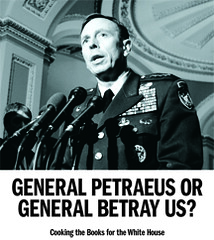The best advertising tends to be the perfect balance of art and science. You can usually spot which campaigns lean too far one way or another by the quality of the message, not the production.
Too much science and the message becomes an exercise in bullet points. Too much art and the ad will become the subject of debate rather than the issue.
MoveOn might know what I’m talking about. For all their clever (not really) shock value in attempting to denounce Gen. David Petraeus, they have only succeeded in shifting the debate from whether or not we need to be in Iraq to whether or not their message is fair and their organization credible. Enough so, even Sen. Harry Reid (D-NV) had to put the usual polarized politics aside.
"The ad is distasteful and frankly, below the level of respect that America's commanding general in Iraq has earned,” Reid said in a letter. “No matter whether any senator supports or opposes the war in Iraq, we should all voice recognition and appreciation of Gen. Petraeus' long and distinguished record of service to our country."
As brands are fragile things; not all publicity is good publicity.
Relatively few people can look at the MoveOn ad like Jane Hamsher did in her article in The Huffington Post: “To join with the right and start firing arrows into their backs is both destructive from a movement perspective and displays tremendous naiveté about what it's going to take to end this war.”
She does, and in doing so, demonstrates the true weakness of the MoveOn ad: in or out, black or white, for us or against us. Stand by your “progressive fighters” at all costs. Tow the line. Or, in other words, let’s make a case for polarization.
Around almost every corner, polarization remains a front runner in creating miscommunication. In our country, it continues to distract from solutions because it creates a political environment of distrust and suspicion while offering public spectacle that can be likened to high school debate teams. One team picks “pro” and other team picks “con” (nowadays both sides generally pick “pro” and change the noun).
From a communication standpoint, only one Democratic team seems to have made the mistake of choosing sides as outlined by MoveOn. Hillary Clinton embraced the message as a blunt speaking point for the following day, opening it up for Rudy Giuliani’s team to ask a pointed question: “Who should America listen to … A decorated soldier’s commitment to defending America, or Hillary Clinton’s commitment to defending MoveOn.org.”
This copy line above is part of a rebuttal advertisement that Giuliani’s team wants to raise money for in order to rebut MoveOn and Clinton. You can see the ad by clicking the copy line on a fundraising page here. It’s not the best ad in terms of political copywriting, but it gets the job done.
Regardless of the issue, the communication lesson is objective: although there are some exceptions, the best messages are those that focus less on polarizing the messengers and more on the issues being discussed. By shifting the message off our presence in Iraq and onto the credibility of someone who was recognized as one of America’s 25 best leaders by U.S. News and World Report, MoveOn buried its anti-war message, made the issue about them, forced would-be allies to distance themselves, and drew at least one candidate into controversy.
If we apply this study to our Fragile Brand Theory, it becomes even clearer where MoveOn went wrong. Rather than stick to the issues, they asked the country to denounce a four-star general or denounce a political action group. The law of gravity, as it applies to our brand theory, suggests that when two brands go head to head (as opposed to point for point), then the one with its collective impressions closest to the middle has more pull and will prevail.
Clinton’s team seems to have missed it. Giuliani’s team seems intent on letting them know it.

Too much science and the message becomes an exercise in bullet points. Too much art and the ad will become the subject of debate rather than the issue.
MoveOn might know what I’m talking about. For all their clever (not really) shock value in attempting to denounce Gen. David Petraeus, they have only succeeded in shifting the debate from whether or not we need to be in Iraq to whether or not their message is fair and their organization credible. Enough so, even Sen. Harry Reid (D-NV) had to put the usual polarized politics aside.
"The ad is distasteful and frankly, below the level of respect that America's commanding general in Iraq has earned,” Reid said in a letter. “No matter whether any senator supports or opposes the war in Iraq, we should all voice recognition and appreciation of Gen. Petraeus' long and distinguished record of service to our country."
As brands are fragile things; not all publicity is good publicity.
Relatively few people can look at the MoveOn ad like Jane Hamsher did in her article in The Huffington Post: “To join with the right and start firing arrows into their backs is both destructive from a movement perspective and displays tremendous naiveté about what it's going to take to end this war.”
She does, and in doing so, demonstrates the true weakness of the MoveOn ad: in or out, black or white, for us or against us. Stand by your “progressive fighters” at all costs. Tow the line. Or, in other words, let’s make a case for polarization.
Around almost every corner, polarization remains a front runner in creating miscommunication. In our country, it continues to distract from solutions because it creates a political environment of distrust and suspicion while offering public spectacle that can be likened to high school debate teams. One team picks “pro” and other team picks “con” (nowadays both sides generally pick “pro” and change the noun).
From a communication standpoint, only one Democratic team seems to have made the mistake of choosing sides as outlined by MoveOn. Hillary Clinton embraced the message as a blunt speaking point for the following day, opening it up for Rudy Giuliani’s team to ask a pointed question: “Who should America listen to … A decorated soldier’s commitment to defending America, or Hillary Clinton’s commitment to defending MoveOn.org.”
This copy line above is part of a rebuttal advertisement that Giuliani’s team wants to raise money for in order to rebut MoveOn and Clinton. You can see the ad by clicking the copy line on a fundraising page here. It’s not the best ad in terms of political copywriting, but it gets the job done.
Regardless of the issue, the communication lesson is objective: although there are some exceptions, the best messages are those that focus less on polarizing the messengers and more on the issues being discussed. By shifting the message off our presence in Iraq and onto the credibility of someone who was recognized as one of America’s 25 best leaders by U.S. News and World Report, MoveOn buried its anti-war message, made the issue about them, forced would-be allies to distance themselves, and drew at least one candidate into controversy.
If we apply this study to our Fragile Brand Theory, it becomes even clearer where MoveOn went wrong. Rather than stick to the issues, they asked the country to denounce a four-star general or denounce a political action group. The law of gravity, as it applies to our brand theory, suggests that when two brands go head to head (as opposed to point for point), then the one with its collective impressions closest to the middle has more pull and will prevail.
Clinton’s team seems to have missed it. Giuliani’s team seems intent on letting them know it.
















